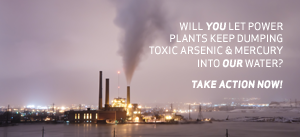
By Bob Wendelgass, President & CEO
The referenced media source is missing and needs to be re-embedded.
I’ve worked in advocacy and politics for a long time and have fought to protect our health and environment from dirty, polluting industries and I thought I had seen it all. But even I was blown away when I saw the extent of the toxic pollution that power plants have spewed into our water for decades. The facts in our report on coal plants across the country, Closing the Floodgates, are astonishing.
For the past thirty years, power plants have gotten special treatment that allows them to dump billions of pounds of toxic chemicals into our nation’s waters. And that special treatment has come at a huge cost to our nation’s waters and to our health. It’s long past time for action and there is no excuse for this pollution to continue. Treatment exists, it’s affordable, and the rest of us can’t afford to pay the price for this continued pollution. Take action today!
In April, the Environmental Protection Agency (EPA) proposed new protections. A few of the proposals (Options 4 and 5) are good and will protect our water, though only option 5 would eliminate almost all toxic discharges. The other ones (options 3a and 3b) maintain the status quo and are essentially, “do-nothing” options. EPA has an opportunity now to do the right thing for our nation’s water and for our health. The Agency needs to reject the “do-nothing” options in the rulemaking and select the option that would require meaningful reductions in toxic discharges.
A few, inexcusable stats for you:
- 155,000 people are affected every year by discharges from power plants, suffering from higher risk of cancer and lower IQ’s. That’s over 4.6 million people in harm’s way over the past thirty years.
- 399 water bodies around the country that are sources of drinking water for local communities have been degraded by these discharges. 40% of the power plants discharges studied in the report are within 5 miles of a public drinking water intake.
- Hundreds of water bodies no longer meet the standards of the Clean Water Act and it’s unsafe to eat fish from hundreds more of our rivers, streams and lakes.
- Contaminants like arsenic, selenium and bromide have caused concern for our nation’s drinking water systems and led to costly new treatment systems and higher water bills in some communities. It is wrong to allow power plants to contaminate drinking water sources and raise costs for communities and consumers when that pollution can be prevented.
- Power plant pollution has also impacted recreational fishing and tourism, which are huge job creators in most states. It’s difficult to recruit anglers to your fishing spot when you also have to tell them it’s unsafe to eat what they catch.
Related Posts
Stay Informed
Get the latest updates and actions:
Thanks for signing up!
There was a problem processing your signup. Please try again.


